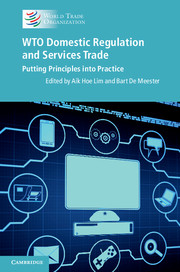Book contents
- Frontmatter
- Contents
- List of contributors
- Foreword
- Disclaimer
- Acknowledgements
- List of abbreviations
- 1 An introduction to domestic regulation and GATS
- Part I Impediments to services trade, regulatory theory and principles
- Part II Legal perspectives on WTO principles and domestic regulations
- Part III Case studies
- 8 Legal services in the United States
- 9 Telecommunications reform in China: fostering competition through state intervention
- 10 Information communications technology: the Mauritian experience of regulation and reform
- 11 Regulation of postal services in a changing market environment: lessons from Australia and elsewhere
- 12 Mobile money services provision in East Africa: the Ugandan experience
- 13 Financial services liberalization and regulation in Japan: implications for future negotiation on market access and domestic regulations
- 14 Domestic regulations in Malaysia’s higher education sector
- 15 Domestic regulations and India’s trade in health services: a study of hospital and telemedicine services
- 16 Operating integrated logistics services in a fragmented regulatory environment: what is the cost?
- 17 Domestic regulation of retail food distribution services in Israel: the missing link between food prices and social protest
- 18 Regulatory impact analysis: addressing the trade and regulatory nexus
- Part IV Concluding remarks
- Index
- References
16 - Operating integrated logistics services in a fragmented regulatory environment: what is the cost?
Published online by Cambridge University Press: 05 April 2014
- Frontmatter
- Contents
- List of contributors
- Foreword
- Disclaimer
- Acknowledgements
- List of abbreviations
- 1 An introduction to domestic regulation and GATS
- Part I Impediments to services trade, regulatory theory and principles
- Part II Legal perspectives on WTO principles and domestic regulations
- Part III Case studies
- 8 Legal services in the United States
- 9 Telecommunications reform in China: fostering competition through state intervention
- 10 Information communications technology: the Mauritian experience of regulation and reform
- 11 Regulation of postal services in a changing market environment: lessons from Australia and elsewhere
- 12 Mobile money services provision in East Africa: the Ugandan experience
- 13 Financial services liberalization and regulation in Japan: implications for future negotiation on market access and domestic regulations
- 14 Domestic regulations in Malaysia’s higher education sector
- 15 Domestic regulations and India’s trade in health services: a study of hospital and telemedicine services
- 16 Operating integrated logistics services in a fragmented regulatory environment: what is the cost?
- 17 Domestic regulation of retail food distribution services in Israel: the missing link between food prices and social protest
- 18 Regulatory impact analysis: addressing the trade and regulatory nexus
- Part IV Concluding remarks
- Index
- References
Summary
Introduction
The importance of logistics services in both the national and global economy is widely recognized and increasingly more apparent. From the trade perspective, the role of logistics services is twofold: it facilitates the international flow of goods and thus provides key support to trade in goods and global supply chains; and, at the same time, it generates trade flow in its own right and constitutes an important industry in many economies. The significance of logistics services has also been underlined in trade negotiations. In 2004, for the first time in trade negotiations, a group of World Trade Organization (WTO) members advocated considering logistics services as a distinct sector. They defined logistics services as dealing ‘with the supply chain process that plans, implements, and controls the efficient and effective point-to-point flow and storage of goods, services and related information, throughout the production, distribution and delivery stages, from the initial suppliers of inputs to final customers of products’. Without ambition to change the current General Agreement on Trade in Services (GATS) classification system, which does not contain a separate category for logistics services, this group of WTO members take a pragmatic checklist approach, encouraging trading partners to undertake commercially meaningful liberalization commitments on all logistics-related sectors. The proposed checklist is very broad, containing about twenty services subsectors which are regrouped into three blocks: core freight logistics; related freight logistics; and non-core freight logistics. Identified core freight logistics services include cargo handling, storage and warehousing, transport agency and other auxiliary services to transport.
- Type
- Chapter
- Information
- WTO Domestic Regulation and Services TradePutting Principles into Practice, pp. 270 - 288Publisher: Cambridge University PressPrint publication year: 2014



